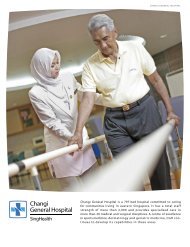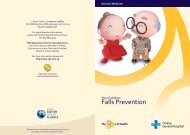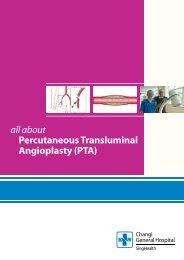Frozen Shoulder - Changi General Hospital
Frozen Shoulder - Changi General Hospital
Frozen Shoulder - Changi General Hospital
You also want an ePaper? Increase the reach of your titles
YUMPU automatically turns print PDFs into web optimized ePapers that Google loves.
What causes frozen shoulder?<br />
The exact cause is unknown. The condition has been linked to auto-antibodies that attack<br />
the joint capsule, resulting in inflammation, adhesion and eventual scar tissue formation. It<br />
may be triggered by injury (including surgery), degenerative changes in the joint, as well<br />
as viral illnesses. This condition is also more common in diabetics. Your shoulder may go<br />
through several stages as the scar tissue forms, with each stage lasting between three to six<br />
months:<br />
1. Freezing stage—you may experience ache and mild stiffness as the disease starts. Pain<br />
worsens as the condition progresses.<br />
2. <strong>Frozen</strong> stage—pain diminishes but stiffness increases. <strong>Shoulder</strong> movements can be<br />
severely restricted.<br />
3. Thawing stage—shoulder movement improves, and you will be able to do more<br />
activities. Complete resolution is the norm but up to 15% of patients may have remaining<br />
movement restriction or weakness.<br />
What will my doctor do?<br />
After a physical examination, an ultrasound scan and X-ray may be required to exclude<br />
other causes of pain. In the early stages, it may be difficult to tell it apart from other painful<br />
conditions affecting the shoulder.<br />
How is it treated?<br />
The disease will, unfortunately, have to run its course. The goal of treatment is to minimise<br />
pain and discomfort during the disease process and to restore full range of motion and<br />
strength by the end of its natural course. Your doctor may prescribe a course of antiinflammatory<br />
medication for symptom relief. Forceful manipulation should be avoided as<br />
this may worsen symptoms. Hydrodilatation of the joint may be required in severe cases.<br />
During this procedure, which is carried out under local anaesthesia, a small volume of sterile<br />
solution is injected into the joint to loosen the adhesions.<br />
CGH <strong>Frozen</strong> <strong>Shoulder</strong> 250809.indd 4<br />
8/26/09 1:29:13 PM
















